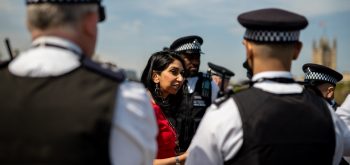An inquiry into the death of an unarmed man shot by a Metropolitan Police officer has found that he was ‘lawfully killed’ despite identifying a litany of failures in the force’s operation. Jermaine Baker was shot dead in his car in December 2015 by ‘W80’, a Counter Terrorist Specialist Firearms Officer, during an attempt by the force to foil a plot to free two inmates inside a security van heading towards Wood Green Crown Court.
The report into his death (available here) concluded that whilst the Met did not act in a grossly negligent manner, and that W80’s decision to discharge their weapon did not amount to an ‘unlawful killing’, the force’s operation was based on the ‘delusional’ idea that it ‘could succeed in ridding the streets of North London of lethal firearms’. ‘I am left in no doubt that had there not been a tragic fatality, none of those failures and shortcomings would have been the subject of detailed external or internal scrutiny, far less criticism, and the outcome of the operation and the way in which it was carried out would have been hailed as a resounding success for the Met,’ said the chair of the inquiry Clement Goldstone QC. ‘I hope and believe that the Inquiry which has led to the production of this report has left no stone reasonably unturned in my effort to get to the truth and to address the questions posed by the Inquiry’s terms of reference.’
Goldstone found that the police’s failure to inform the agencies affected by the apparent plot to free the inmates, namely HMP Wormwood Scrubs, Wood Green Crown Court and Serco, played a part in the escalation of the operation. This, the inquiry noted, ‘was indicative of an arrogant, dismissive attitude towards formality and a failure to appreciate the importance of accountability’. Providing evidence to the inquiry, the mother of Jermaine Baker stated that ‘he was involved in a crime and should have gone to the prison like the others involved’ in the plot, and that ‘nobody needed to die’.
The inquiry noted that the decision to establish a geographical ‘tipping point’ to prevent Baker’s vehicle from coming into contact with the Serco van, rather than to share information with the relevant parties, did not give ‘sufficient consideration’ to principles under Article 2 of the European Convention of Human Rights. ‘The planning of operation Ankaa fell short of that which would have been reasonable, in particular having regard to the need to minimise to the greatest possible extent the risk to life’. The inadequate installation of audio equipment in the suspects’ vehicle, which meant that officers mistook the possession of an imitation firearm with that of a real weapon, was amongst one of the failings identified by the inquiry that contributed to this lack of consideration.
‘The set-up and choice of equipment… was deeply flawed in that there was no split-feed, and it was not possible to hear what was being recorded if another person was listening to a review.’ The failure to set up this split feed was described by Goldstone as ‘one that could have been reasonably expected’. Turning to the moment of the shooting, the chair of the inquiry concluded that W80 ‘held an honest and genuine belief that Mr Baker was moving in order to reach for the firearm’ in a man-bag on his chest.
‘Given the extent of these failings and the obvious role they must have played in Jermaine’s death, the family is at a total loss to understand how the judge can have come to the conclusion that Jermaine did not die as a result of those failures,’ said the solicitor for Baker’s family Michael Oswald. During the inquiry, counsel to Baker’s family argued that he was raising his arms to surrender and as he was unarmed, could not have been reaching for the bag or any weapon.
‘It‘s difficult to comprehend how such catastrophic failings were not assessed by the judge to have contributed to Jermaine’s death,’ said Anita Sharma, INQUEST’s head of casework. ‘As the Metropolitan Police is subject to special measures, this report is yet more evidence of the systemic failures of this force, and harmful policing practices nationally. We must see accountability for those involved in Jermaine’s death, to send a message to police leadership and officers that they are not above the law. The failure to hold police to account breeds impunity which ultimately allows deaths and harms to continue.’
In November 2018, the Independent Office for Police Conduct (IOPC) recommended that the Met commence disciplinary proceedings against W80 for gross misconduct in using excessive force against Baker, a direction which was subsequently challenged by the force. In October 2020, the Court of Appeal overturned a ruling in the Divisional Court which quashed the IOPC’s decision.
The case is currently the subject of ongoing proceedings before the Supreme Court, which granted permission to appeal in February 2022.








